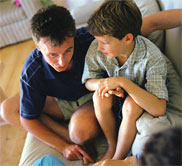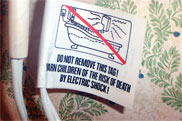All parents want their children to lead happy, abundant, successful lives. But this will not be achieved by accident. Children need specific guidance. Everyone recognizes that people are most influenced when they are young. This is why it is so important for parents to instill, beginning from a very early age, the proper focus and framework on which to base their lives.
The next three chapters contain an extensive list of different attributes and qualities to teach your children. No book of this kind could address every important character trait necessary to lead a happy, productive life. Therefore, this list is not all-inclusive, and other points could certainly be added to it, but it covers all of the most crucial things that children need to learn in order to be properly equipped for adulthood.
Parental involvement is critical in the successful education of all children—meaning not just how well they do in school but in a host of other vitally important areas of their development. It has been demonstrated that children tend to thrive in a more tightly managed routine. This is particularly important when it comes to how well they will do in school.
For instance, as we have seen, doctors and educators now talk in terms of “Attention Deficit Disorder” (ADD) and “Attention Deficit Hyperactivity Disorder” (ADHD) when they are describing a child that is out of control. In reality, many of these children have been permitted to grow up out of control—without order and structure in their lives—and these terms have been invented to provide an excuse for what is usually merely bad parenting. A growing number of voices are announcing that vast numbers of parents have been “had” by false theories that have led so many parents and children to believe that they have a “disease” that needs to be treated with medication, rather than a behavior problem that is linked to faulty character above all other factors. Yet, there are now over six million American children who are being medicated for ADD and ADHD.
In the end, it will be up to you to help your children develop all the necessary traits and qualities that will permit them to come to full maturity. These will be the subject of discussion in the next three chapters. Understand that there is necessarily a certain amount of overlap on the many principles and other aspects of teaching throughout the book.
Make Clear the Importance of Setting Goals
By age 70, many people will have spent about ten years watching television. There are thousands of television programs waiting to capture your children’s minds and reduce them into mindless “sponges,” absorbing information without being able to differentiate between what is good and bad for their consumption. Without your intervention, your children are almost certainly destined to become “couch potatoes.” Millions today waste their entire childhood in physical and mental idleness, staring at “the tube.”
You can counteract this by limiting your children’s television watching, and by teaching them to set proper goals.
Teach them to read books—and to perhaps write book reports (my grandfather paid me one dollar for every book report that I wrote and read to him over the phone, as long as it had over 300 words). Encourage them to take up hobbies, such as building model ships or airplanes, or collecting coins, stamps or postcards. Guide them to participate in sports, such as basketball, soccer, tennis, swimming, etc. Encourage them to learn a musical instrument, such as the flute, guitar or piano. They can learn to skate, build and fly a kite, keep a journal, make watercolor or oil paintings, model with clay, keep a garden, and many more things—the list is endless.

When hobbies are encouraged and interests are developed, confidence is built. Children learn that they can enter the adult world expecting to succeed.
Help your children expand their minds and explore their talents. They have untapped gifts just waiting to be discovered. But they need your guidance to do this.
Teach your children to write down their goals. Over time, they will learn which goals can be reached, which should be amended and which should be dropped. Then teach them how to take steps toward the goals, and to be able to measure their progress along the way. Be sure to remind them often that the Proverbs teach, “The desire accomplished is sweet to the soul” (13:19).
Sports will teach them lessons and values. (“It’s not whether you win or lose, but how you play the game”—following the rules, respecting the coach and learning to emphasize teamwork.)
Coach your children to participate in activities with enthusiasm, and not to give up or quit when “the going gets tough.” It has become a sign of the times that poor sportsmanship has sunk to new levels, with professional athletes leading the way. Sadly, the problem of the proverbial “little league parents” out of control has grown to epidemic levels as well. This means many children have become poor losers.
You must teach your children to cope with losing—but to desire to achieve!
Guide Toward the Pursuit of Excellence
Strive to instill within your children the desire to reach their potential, to go above and beyond what is expected of them—to learn how they can do much more than they ever thought possible. Teach the principle of Ecclesiastes 9:10: “Whatsoever your hand finds to do, do it with your might.”
Any goal or thing of worth requires hard work—one must pay the price. Most today are no longer willing to pay that price and will happily settle for second best, or less.
Teaching your children to persevere will give them the inner strength needed to achieve their goals. This will have implications in not just their goals and desires, but in every aspect of their lives! Teach your children to never give up—even in the face of hardship—and you will virtually ensure their success.
Inspire your children with the knowledge that life rewards those who go the extra mile: “See you a man diligent in his business [NKJV: “who excels in his work”]? He shall stand before kings; he shall not stand before mean [inferior] men” (Prov. 22:29).
Jesus had much to say about those who only do what is expected of them. Notice this: “But which of you, having a servant plowing or feeding cattle, will say unto him by and by, when he is come from the field, Go and sit down to meat? And will not rather say unto him, Make ready wherewith I may sup, and gird yourself, and serve me, till I have eaten and drunken; and afterward you shall eat and drink? Does he thank that servant because he did the things that were commanded him? I think not. So likewise you, when you shall have done all those things which are commanded you, say, We are unprofitable servants: we have done that which was our duty to do” (Luke 17:7-10).
Most people today are not interested in going above and beyond, preferring instead to do as little as possible. Many are now perfectly willing to do sloppy, slipshod work, no matter the waste or cost to the company, because they are in a hurry to finish—with so many always looking ahead to the next thing that will be “fun.”
Not only should your children be willing to go the extra mile, but they should always be willing to do it with joy, zeal and enthusiasm—from the heart! Regardless of the problems they are facing, do not let them mope or moan about “how hard” things are or how hard their life is. Remind them that things could always be harder—and probably will get harder at times later in life.
Help Your Children Discover Their Talents and Interests
Some people live their entire lives unaware of what their strengths are, or worse, believing that they have none. Most often, this has been because no one helped them discover these talents, and they did not know how to do this themselves. While this book can only scratch the surface of the subject, it should at least inspire you to see that you can greatly encourage and inspire your children if you help them see the natural talents that they were born with. If tapped, apart from the importance of their relationship with God, these qualities offer them the greatest chance for fulfillment and happiness.

Help your children realize their potential by looking for talents that might need reinforcement. Teaching the habit of pursuing and sticking with a goal instills perseverance—stick-to-itiveness—and brings countless rewards.
Think of it this way: Almost every human being has strengths and weaknesses. There are virtually no exceptions to having some talents and absolutely no exceptions to having certain weaknesses. One of your tasks is to help your child discover his or her God-given abilities, talents and interests. For instance, your child may be extremely gifted in a particular area or way, and this gift could be something that has never before appeared in your family. Be on the lookout for such gifts, and do not squash them when you see them simply because you have never seen these particular talents or abilities before or because they are not your strengths. On the other hand, do not decide that you see talents that are not really there. Be careful that you do not try to remake your child in your own image. You are a unique human being, unlike any other person on the face of the Earth.
So is your child!
Consider for a moment your own strengths and interests, regardless of how you came to know of them. What if your parents, teachers, coaches or employers had never taken an interest in your potential, or worse, actively sought to quash these interests? What if you had never been able to discover and develop them? How different would your life have been? Would you be in the same career or even close to the level of happiness that you have been able to enjoy? The answer is almost certainly not.
The other side of the coin is that it is possible that your mentors did not encourage you to develop your strengths, and to become all that you could have. If this is the case, avoid doing the same with your children. You can yet thrill to the realization of a success in their development that you never had, and this will be a reward unlike any other a parent can enjoy!
Do your children have an interest in music, art, science, mathematics, sports, model-making, stamp-collecting, horticulture, animals, reading, rock-climbing or a host of other things? Strive as hard as you possibly can to recognize and nurture these interests. Ask your children what they enjoy. Observe and talk to them. Try to discern where they may and may not be naturally talented and where their interests lie. Try to be supportive in a balanced way, also not allowing them to quit simply because the early going in a particular sport or activity is tough, when this is always the case in any new endeavor.
Set Limits
Of course, costs can create certain limits—skydiving?!, deep-sea fishing?!—and children cannot pursue every sport, every hobby, every musical instrument, every activity—and every dream—that they may have. Obviously, everything in life has a reasonable and natural limit. Teach your children this principle and to be able to find this limit on their own, in everything that they do. They must also understand that they should finish what they start and not hop around from activity to activity, sport to sport, and hobby to hobby, or they will never learn perseverance and to continue through to final achievement.
A word of caution. Avoid at all costs turning your children’s interests, talents or gifts into “idols” that you and/or your children unwittingly worship. This can happen most often where a young person has an unusual or truly extraordinary gift. The parents of such children must work exceptionally hard to keep their child from becoming unbalanced and overly focused on one gift or one interest to the exclusion of all others. Be careful of this, or your child’s extreme gift will sentence him or her to a lifetime of extreme misery!
It could be said that much of the satisfaction of a happy life is about reaching one’s potential, and even more so with special potential. On occasion, and this will be very rare, private coaches may be a help if, when weighed against all other priorities, it fits into the family budget.
Strive to stand behind your children as they explore what they can and cannot do.
The Worst Parental Sin—Spoiling Your Children!
The subject of the last sections introduce a related subject, and one that could scarcely be more important.
There could be no more awful curse to place upon a child or children than to be a parent who spoils. This produces a host of problems in both the character and personality of children that will adversely affect them for an entire lifetime. But it does not even end there because the effects will then be transferred and intensified in subsequent generations.
The generation that lived through and experienced the Great Depression of the 1930s, and that suffered through the myriad of horrors, as well as the holocaust (of many nations), of World War II, was left forever changed by what they endured. This is often referred to as “The Greatest Generation.” Among other qualities learned and instilled, these millions were more hard-working, stronger of character, thankful for freedom, courageous, willing to sacrifice, patriotic, more appreciative of all that others take for granted, and held a completely different perspective toward what people perceive today to be their “rights.”
History has shown that the peoples of America, Britain and other Western democracies came through perhaps their gravest trials ever because of the sacrifice of millions (many of whom lost their lives) who thought in terms of integrity, honor and the privilege of freedom. This thinking has been replaced by a belief based on entitlement, meaning liberty, material possessions and all the good things of life should be automatic—are birthrights.
But, like every generation, even this “greatest” one were parents. As such, they made one seemingly collective, terrible mistake—they decided their children must never have to endure the rigors, difficulties, challenges and “going without” as they had to experience. This is perhaps likened to the parent who was spanked too often as a child and erroneously concludes, “I will never spank my children.”
The result was a generation, usually referred to as “baby boomers,” with less interest in building character and more interest in focusing on themselves and in the accumulation of physical things. But it got worse. The baby boomers in turn reared a terribly spoiled, ego-driven generation that was dubbed “Generation X” because no one had any idea how they would ultimately turn out. The end product was far from good. But it got worse—again. The less industrious, selfish, largely “pain-free” Generation X we saw went on to produce a yet again much worse next generation—and this is true of strength, character, values, selfishness, knowledge, experience, health, and almost every other measure of success in the life of any human being. If Generation X is immoral—and it is—this one is amoral, and in almost every way.
This newest generation, the “Millennial Generation,” could only be described as infinitely more spoiled—truly rotten! (as you have understood from Chapter Two)—than their relatively barely spoiled baby boomer grandparents just two generations older. Those were virtual paragons of altruism and selflessness by comparison. It is as though the modern generation believes themselves put on Earth for the sole purpose of pleasure and partying.
Avoid at All Costs!
Parents, above all, do not spoil your children. Avoid this trap at all costs! If you do not, you are literally sentencing them to be stubborn, selfish, self-focused, ego-driven, rude and demanding, and almost entirely materialistic. The net effect is that they will be powerless to deny themselves their every want, and to miss the pain and suffering that comes with this. In addition, you will have made them weak and built into them a sense that everything should always be fair (discussed momentarily)—and that they are entitled to all that they have—to what previous generations earned—when this is not true of life.
You are also instilling into them, and this is often done by over-praising, that they are “special” and/or “gifted.” This thinking (a plain lack of humility) will make them very difficult or impossible to teach because they will not receive criticism. They will find it difficult, or be completely unable, to admit they are wrong, no matter the offense. They will, however, be well able, and happily willing, to criticize the shortcomings of others.
After a while, such children in effect “own” their parents—and from a young age they realize this. This is because the parents have been more willing to cave in to—even constantly “make” over, if necessary—them than to deal with the exhausting aggravation and hassle of never-ending arguments and whining from the child every time it does not get its way! Ask: How often have you heard, or found yourself exclaiming, “I just can’t deal with them”?
Finally, the children who are the greatest candidates for being spoiled are often the “only child,” or the last born—“the baby”—and particularly the “late life baby” who either came much later than its siblings or after the parents were told that no more children were possible. (But this can also happen with a firstborn child.) When older, and having reached the stage of thinking more like grandparents, such parents often find it difficult to discipline such children, and even more difficult to tell them “no.”
Be on the lookout for the natural tendency—a potential within every parent!—to run a popularity contest with his children and to take the easy path of “smothering” them with the best of everything. (I wish I had a nickel for every time my father reminded me that “I am not running a popularity contest here.”)
Make this a simple equation: spoiling usually equals ruining!
Repeat often to your children that they are no better than anybody else, and that the measure of their value and success is solely tied to regular contact with God, strength of character, pursuit of the right goals, willingness to overcome obstacles in their path, real achievement, how much they give versus get, the amount of honor extended to generations that have gone before them, and the volume of effort and sweat expended to earn what they have.
Instill these and other vital, related internal qualities with an unceasing relentlessness that your children cannot miss for their importance!
There is no greater parental sin than spoiling children!
Teach Your Children They Cannot Always Have Their Way
Millions of parents now routinely cater to their children. The ways in which they do this are practically endless. It is as though parents feel they must satisfy their child’s every whim—and do this on an almost minute-to-minute basis.
Take just the matter of bedtime. Vast numbers of children, when put to bed, will get up for a host of reasons, offering a creative variety of excuses—“I’m hungry,” “I’m thirsty,” “I can’t sleep,” “I’m scared” (in this case, said as an excuse), “I’m not tired,” “You didn’t read me a story”—and parents are trapped as real prisoners to their children’s inventions about why they do not need to obey their parents—and GO TO SLEEP! Worse, I have observed many parents who cannot put their child to sleep unless they take him into the car and drive him around, sometimes for long periods, until he falls asleep. This is costly, time-consuming, fatiguing—and ridiculous!
This kind of catering teaches children to grow up expecting to be catered to and sets them up for a rude awakening.
There are some things we just cannot have. Fair or not, that’s life—and your children must comprehend this. However, most parents have no idea that they should be instilling into their children even this most basic fact of life.
Try this experiment: The next time you are walking through a supermarket, listen to parents talking to their children (and try to notice if you are seeing and hearing yourself at the same time). Watch how parent and child interact. While it may not be obvious at first, you will notice that the child is getting what he wants and the parent is almost invariably giving in and obeying the child. Today’s children can be seen actually directing their parents.
For instance, a toddler may grab cookies from the shelf while his mother is pushing the cart down the aisle. When the mother takes the cookies and returns them to the shelf, the child often explodes into a tantrum. Frustrated, the mother attempts to reason the child back to calmness, by coaxing and explaining—and sometimes turning to pleading and begging—that this is not the proper reaction, and not the right place to “express” himself.
This may be followed by a series of attempts to verbally placate the child, all of which ultimately fail. Finally, driven by embarrassment and desperation, the parent places the cookies back into the cart, quickly calming the child—but teaching him a devastating lesson. This “lesson” often goes so far as to include opening the package immediately and giving the child a cookie. I have seen it.
Instead of simply being told “no,” and responding obediently—and demonstrating happiness with the parent’s decision—the child learns how to manipulate his parents in order to get what he wants—how to satisfy his wants or desires. In effect, the parents are teaching the child to do, feel and think what is “right in his own eyes” (Prov. 12:15), with no regard for those around him.
Even God’s most faithful servants did not always receive what they desired or asked for. God used Moses to guide ancient Israel out of Egypt, and through 40 years of wandering in the wilderness, until coming to the Promised Land. Yet, Moses was not permitted to enter the land with Israel.
Paul faithfully preached and spread the gospel of the Kingdom of God throughout the Roman Empire. Throughout his ministry, he never wavered in teaching the full truth of God. Yet, the facts of history indicate that circumstances had taken him from what must have once been a previous life of considerable comfort. Here is what he recorded:
“Are they ministers of Christ? (I speak as a fool) I am more; in labors more abundant, in stripes above measure, in prisons more frequent, in deaths often. Of the Jews five times received I forty stripes save one. Thrice was I beaten with rods, once was I stoned, thrice I suffered shipwreck, a night and a day I have been in the deep; in journeyings often, in perils of waters, in perils of robbers, in perils by mine own countrymen, in perils by the heathen, in perils in the city, in perils in the wilderness, in perils in the sea, in perils among false brethren; in weariness and painfulness, in watchings often, in hunger and thirst, in fastings often, in cold and nakedness. Beside those things that are without, that which comes upon me daily, the care of all the churches” (II Cor. 11:23-28).
Educate your children to the basic fact that they cannot always get what they want—that life does not always deal them the hand they expect or feel that they deserve. Like Paul, they must learn to be satisfied with—and appreciate—what they have. Here is what suffering and difficulty taught Paul: “Not that I speak in respect of want: for I have learned, in whatsoever state I am, therewith to be content. I know both how to be abased, and I know how to abound: everywhere and in all things I am instructed both to be full and to be hungry, both to abound and to suffer need” (Phil. 4:11-12).
Since God gives the above instruction to you as a Christian, you will increase your child’s future happiness immeasurably if you teach him to be content with his life, including all the things that he cannot control.
Teach Your Children Life Is Not Fair
Prepare your children for perhaps life’s harshest reality: What happens is not always fair. Some people are born blind, deaf or otherwise physically disabled. Sometimes, people with less talent but more attractiveness or better “connections” are selected for certain responsibilities or rewards over those more qualified.
Your children need to know that they could be discriminated against because of their social or economic background—or because of their accent, nationality or race. Explain that these injustices could happen to them.
Then teach your children that even Christians who faithfully obey God could also be discriminated against—that, at times, they will almost certainly suffer injustices. In all these things, remind them that this is not God’s world, and that their ultimate reward comes from Him.
My father made a point of telling his three children, literally, that he was not trying to be fair, and actually had no interest in being fair—because life is not fair. His thinking continued: if he always needed to be fair—something he knew was not really possible in many cases with children, anyway—he would be programming us to believe that we would always be treated fairly when this is not what life is for anyone! He wanted us to understand that we had to succeed when things were not fair, and to not waste time believing life would always deal us “a good hand.” In other words, he taught, you have to play the hand you are dealt either way, so practice succeeding with “a bad hand.”
If you ready your children at an early age, they will be prepared for life’s stumbling blocks and take them much more in stride.
Teach Your Children the Meaning of the Word “No”
Tragically, most parents are no longer willing or able to tell their children “No!” in emphatic terms. Modernists have seduced millions of parents into reasoning with their children—endlessly! A generation of child psychologists have carefully taught parents how to reason with their children over almost every issue—to ask their child if they will do this or that, seemingly needing to get permission from the child to secure obedience.
Schooled in the false theory of evolution, which rejects revealed knowledge, these “educators” are themselves educated in all the wrong values and, lacking true understanding from God, have assumed that godly forms of punishment harm children’s self-esteem and development. Such reasoning has been proven unsound, and studies show that children are actually incapable of reasoning in any but the simplest matters until they reach age seven or eight.
“No” is the most character-building word in the English language. Your children have a right—and need—to hear it from you! Never be afraid to tell them what they NEED to hear in lieu of what they may WANT to hear. You are the parent. They are the children. Keep this distinction clear—in your mind and theirs.
Ask yourself how often you hear others—or yourself!—tell your children to do something (anything) followed by the request for their stamp of approval by ending with “Okay?”—“It’s bedtime, okay?”, “Put your toys away, okay?”, “Let’s eat your green beans, okay?”, “Let’s put your coat on, okay?”, etc.
More Shocking Television Statistics
The reach of television has changed dramatically. Children once had only eight or nine channels to choose from. If there was nothing interesting to watch, they had to find something else to do—ride a bike, draw pictures, play outside, etc. Never mind before television existed.
Today, children have access to hundreds of channels. There are individual stations specifically devoted to action, mysteries, westerns, cartoons, food, game shows, history, pets, comedy, soap operas, science fiction and religion. The list is growing—even exploding!
With so many channels to “surf,” it is not surprising that time spent watching television has skyrocketed, especially among children. Sixty percent of all children watch television and use the Internet an average of six hours daily.
In a survey of 3,155 children ages 2 to 18, half said that they did not have parental rules limiting their time viewing television or the kinds of programs they watched. And 61% of children ages eight and older said they watch what they want, when they want.
According to one study:
(1) Men and boys portrayed on TV often focused on the opposite sex. One boy in the study said about a character, “His main goal is to get the girl.”
(2) One in five male characters uses physical aggression to solve problems.
(3) 49% of the children polled watched music videos daily.
(4) More than 25% of the videos included some degree of attention to female breasts, legs or torsos. Also, 50% of the time, women were likely to be featured semi-nude or dressed in revealing clothing.
Here are more facts about TV viewing in the U.S.:
- 98% of households have at least one television, 34% have two, and 40% have three or more.
- In the average home, television is on 7 hours, 40 minutes per day.
- Among children ages 2 to 11, the average child watches 1,197 minutes—almost 20 hours—of television per week! Yet, his parents only engage in 38.5 minutes per week of meaningful conversation with him.
- According to the U.S. Department of Education, “Academic achievement drops sharply for children who watch more than ten hours a week of TV.”
For example, 6th and 12th grade California students who were heavy TV watchers scored lower on reading, written expression and math achievement tests than students who viewed little or no television. - 52% of children ages 5 to 17 and a very high percentage of children ages 2 to 5 also have a TV in their bedroom.
- 70% of daycare centers use television during a typical day.
- When asked to choose between watching TV or spending time with their fathers, 54% of children ages 4 to 6 preferred television.
- The average youth spends 1,500 hours per year watching TV—but only 900 hours per year in school.
- There is only a 1-in-12 chance that parents will require their children to do their homework before watching TV.
- By the time the average child completes elementary school, we saw that he or she will have witnessed more than 100,000 acts of violence on TV, including 8,000 murders. By age 18, these numbers double!
- We also saw that by age 70, most people will have spent about ten full years watching television.
- 80% of Hollywood executives believe there is a link between TV violence and real-life violence. Yet they do nothing about the programming that they offer!
- 81% of children ages 2 to 7 watch television alone and unsupervised. This rises to 95% for older children.
- According to a 1999 CNN report, “…a typical teen-ager views nearly 15,000 sexual references, innuendoes and jokes on television each year, of which fewer than 170 deal with abstinence, birth control, sexually transmitted diseases or pregnancy…
“The so-called television ‘family hour,’ from 8 p.m. to 9 p.m., contains more than eight sexual incidents per hour—four times as many as in 1976…
“Alcohol, tobacco or illicit drugs are present in 70% of prime time network dramatic programs…” - Children who are extensive television watchers tend to have a greater risk of obesity, alcohol and drug abuse, and sexual activity.
- Children who watch 4 or more hours of television daily spend less time on homework, have poorer reading skills, interact less well with friends, and have fewer hobbies than children who watch less TV.
- According to www.limitv.org: “Watching TV impedes the growth of longer attention spans…the approximately seven minute length of program before a commercial interruption can condition a child to a seven minute attention span. The Wall Street Journal, February 10, 1994, relates the experience of Odds Bodkin, who performs before some 100,000 people a year, most of them children.” (Recall his comment that after about seven minutes, restlessness sets in as children’s inner clocks anticipate a commercial break.)
“Watching TV interferes with the development of reading skills. A child must learn to move the eyes back and forth across the page in order to read. But with television, the eyes fix on the screen. One hour a day in school learning to move the eyes back and forth cannot compete with four or more hours with the eyes fixed on a TV screen. It’s little wonder that many children find difficulty learning to read.”
For those who will receive the message, a fully mature adult parent asking a small child for approval is a towering statement about who is in charge—and doing this will teach your child to become a debater, and that your every instruction is up for discussion. Your children need to ask YOU if something is okay or not. YOU are supposed to be in charge, never the child!
No wonder the prophet Isaiah said of the final age before Christ returns, “As for my people, children are their oppressors…” (3:12). It is the sad experience of millions of parents today that their children have virtual mastery over them, running them ragged, with the parents having no idea what to do about it or even that it should be any other way. Modernists have coined the phrase “childcentric families” to describe millions of today’s homes. In what has been called “a vast family management meltdown,” great numbers do not know where to turn or that God gives instruction in such matters.
Your Authority Is Often Enough
Teach your children to accept the simple phrase, “Because I said so,” and that this may be all the explanation they will receive. They will learn to submit to authority without having to always know why.
When I tried to tell my parents in circumstances where I wanted a reason that they were unwilling to give, I tried perhaps a couple times to tell them, “Well, other parents allow my friends to do (whatever may have been the case).” Invariably, my parents answered with a simple, “You don’t have other parents. You have us!”
On a side note, for those who need their very small children to be quiet in public places or at church services, it is crucial that you teach them when to “hush.” While it is wonderful to watch tiny children “discover” their voices, they must understand that there is a time and place for this. Be sure you are regularly teaching your children the importance of “quiet time.” This means making them practice at home. Your children need to understand that at naptime, or at any other time you want them to do this, they must respond to the meaning of “head down.” It is a good idea to try to coordinate your little children’s naptime to the time you need them to be quiet, such as during church services. But this also applies to them being quiet when awake in a public place, such as a restaurant.
Be sure that you are requiring obedience in every circumstance. Never fall for the siren song that disobedience is “just a stage they are going through” or that they are experiencing the “terrible twos,” which inevitably lead to the “terrible threes” and the “terrible fours.” The real problem is simply terrible disobedience.
Unfortunately, too many parents have taught their children, through nagging and not applying proper discipline, that “no” means “maybe,” “possibly” or “we’ll see.” Make your children understand that “no” is not the opening round of a negotiation. While this does not mean that you can never ask their opinion, they must understand that your decisions are final! You will love the benefits of following this principle—and the peace and rest that it will give you in the place of endless frustration. Remember Proverbs 29:17, which showed that practicing proper childrearing can result in your children “giving you rest.”
Also, children must learn very early that their parents do not exist for the sole purpose of making them happy—for satisfying their every whim, want and desire. The God-ordained role of parents is to provide for and train children, while instilling in them all the attributes, qualities and skills necessary to be productive, successful and happy.
This means that parents must not fall into the trap of thinking that they must buy everything the child wants. (Of course, television ads are not your friend in this regard.) Many do this in an endless, exhausting—and very expensive—cycle. While you may wish to get the occasional really special item your child desires, remember that nothing will remain special if he can have everything he wants.
Educate Your Children in the Art of Communication
The ability to communicate effectively is one of the most important skills to acquire, and socializing in a host of different settings is inseparable from life! Being able to communicate effectively will benefit your children in countless ways—and for the rest of their lives. It will help them build friendships, open doors for them and help them succeed in the workplace.
The art of communication takes practice. It takes time to learn to accurately and tactfully express yourself, and to communicate well with others. Children will not do this naturally. Most people today use the same words, terms and phrases over and over, generally because they never learned to develop their vocabulary. They continually fall back on very weak expressions. Here are just a few things people say when they do not know what to say next—when they do not know how to respond with something of meaning or value: “You know,” “okay?”, “really!”, “yeah, right,” “you know what I’m saying?”, “like…,” “uh-huh,” “whatever,” “and what not,” “totally!” and “suuuure!”
Parents and schools once placed a strong emphasis on doing a tremendous amount of reading, particularly of longer books. This greatly enhanced people’s ability to converse across a wide range of diverse ideas and thoughts—as well as to think about those ideas and thoughts. This served to make people familiar with famous authors, philosophy, world history, geography, current events and world conditions, great leaders, and so much more—and their discussions reflected depth.
This has all changed. In a world in which millions of teenagers and young adults lead a soap-opera existence, where most seem to discuss little more than an endless stream of shallow, unimportant topics—usually centering around updating one another regarding not much more than the typical “he said, she said” events occurring in other people’s lives—very little meaningful conversation occurs.
I learned the value of expanding one’s vocabulary very early. From the time I reached first grade, my mother required me to get our enormous family dictionary (it was almost as big as I was at the beginning) to look up words that I did not understand. Although it frustrated me then, because none of my friends’ mothers required it, I am now grateful beyond words for this exercise. It is still enriching my life over fifty years later.
Teach your children that they can rise above all of the nonsense—that they can think and talk about bigger things, including important ideas, and what is happening in the world around them that is changing so quickly. Also, encourage them to express thoughts with color and enthusiasm, and to expand their vocabulary by learning and using new words. They will discover that others will find them interesting, and even fascinating, to talk to. They will stand out to those who think!

One of the greatest gifts you can give your children is a hunger for knowledge, and this can be cultivated in children when young. Teach your children to love learning. They will love you later for it.
Encourage Your Children to Respond and to Reflect Thoughts and Feelings
Young people in this generation have come to be jaded, cynical and perpetually moody. So many appear to be almost entirely joyless, bored and selfish. Observe a group of typical teenagers, and you will notice that most seem to wear expressionless, emotionless masks, hiding their true feelings. Instead of saying what they really feel, they generally say what adults want to hear. One of the tragedies of our time is that almost an entire generation literally does not know how to talk—how to intelligently express a thought. Of course, not all thoughts are simple. Many are quite complex and require intelligent analysis and a larger reservoir of words through which to convey them than exists in the vocabulary of the average young person today.
Teach your children to be bright and enthusiastic—to respond to events around them. Do not allow them to be cynical or moody, or to develop and hold wrong attitudes. Make them change their mood and tone. This will lead to a habit of making themselves do this. The universal mantra of youth today is “I’m bored.” What makes this so incredible is that never have children had so many kinds of things to occupy their time. This becomes its own great testimony to the fact that having everything has little to do with having happiness!
Children should literally almost never find themselves bored. It has been shown that boredom has often been a precursor to creativity. When your children are complaining of boredom, this can be a message to you that you are not teaching them to explore, to think “outside the box”—to create with their God-given minds. Turn these opportunities in a creative direction.
Teach your children to develop the capacity to enjoy! The Psalms declare, “This is the day which the Lord has made; we will rejoice and be glad in it” (118:24). How many people do you know who practice this way of thinking? The answer is surely many fewer than just a generation ago. How many parents are teaching this kind of approach to their children, focusing them on the challenge of each new day that lies ahead?
Let me offer an aside: My mother emphasized learning to enjoy what we did as children. Her own example made this easier. Because she was a gourmet cook, many were the evenings, at dinner time, when she had prepared something unique—and new to us—and then announced, “Children, tonight we are going to tutor our taste buds.”
Do not permit your children to function like robots. Teach them to feel, to have empathy for others. For example, teach them to be happy when a friend or schoolmate wins an award. Also teach them to be sensitive to the suffering of others.
Consider the big picture of Bible prophecy: In the future, God will allow many nations to suffer what is called the Great Tribulation. This describes a time of military invasion, captivity and slavery for countless millions. But He will show favor to those who “sigh and cry” about all that they are witnessing.
Notice Ezekiel 9 and the message it contains about how God wants his servants to feel regarding the increasing suffering of so many around the world: “And the Lord said unto him, Go through the midst of the city, through the midst of Jerusalem, and set a mark upon the foreheads of the men that sigh and that cry for all the abominations that be done in the midst thereof. And to the others He said in my hearing, Go you after him through the city, and smite: let not your eye spare, neither have you pity: slay utterly old and young, both maids, and little children, and women: but come not near any man upon whom is the mark” (vs. 4-6).
God expects His servants to feel deeply for others, to demonstrate real concern for them—and to be able to reflect that concern in words and body language. Teach your children to do these things, that sympathy and empathy for the plight of others is inseparable from life! In so doing, you will have done your children a great service, and will have indirectly taught them to be more thankful for the special knowledge that God has given you and you are giving them.
Require Proper Handling and Saving of Money
The entire Western World is awash in consumer debt. The ease with which credit can be obtained, and the constant temptation to overuse credit cards, coupled with a growing lack of restraint and self-control in the world at large, are pushing more and more people into the financial tragedy of bankruptcy. But far greater numbers are living right at the limit, having put themselves on the edge of bankruptcy.
Instill into your children the value of saving for “rainy days,” because hard times always come. In a world driven by the urge for instant gratification—where merely seeing something in a store window means that one must have it NOW!—people are no longer taught or see the need to save. Building a “nest egg” for marriage, retirement, to buy a home or to send children to college, is no longer as important to millions of families. Implant the big picture into your children from an early age. Train them to save by telling them that they can buy certain items if they are willing to patiently save first. Perhaps be willing at times to share the cost with them, when they do this.
Prepare your children to understand that they must plan for and pay bills (and to do so on time). Many couples get married with little or no training (and, in some cases, without even an expectation) that they are soon going to actually receive a “light bill”—and that it will have to be paid on time!
Start your children off with the habit of regularly paying God’s tithes and offerings—first! Teach them to make God their “financial partner” (Mal. 3:8-12). Distribute their allowance in a way that they can easily subtract 10 percent. Teach them that 90 percent goes farther when they have God’s blessing than does 100 percent without it—and that they literally cannot afford not to tithe. While God’s “math” makes no sense to the carnal mind, tithing brings extraordinary blessings to those who faithfully practice it. Though it takes faith, it always pays in the end. (To learn more about tithing and the blessings that following this command brings, encourage your children to read my booklet End All Your Financial Worries. Then they should also consider reading Taking Charge of Your Finances.)
Teach your children the far-reaching importance of money—that it can only be spent once, that it should always be spent wisely, that credit cards can be a wonderful blessing or a curse of catastrophic proportions carrying the potential to cripple an entire future, that God’s tithes come first and that saving is important, among numerous other principles.
Have your children occasionally report to you what they did with their money. This will teach them to carefully account for it. It will also help them avoid being enslaved to a lifetime of stress, constantly overwhelmed by debt.
Teach your children that they have no hope of success in life without learning to properly handle money!
Guide Your Children to Be Selective in Choosing Entertainment
We saw that the average American child (all ages included) watches an astonishing 6.5 hours of television each day. A typical teenager is exposed to nearly 15,000 sexual references, innuendos and jokes each year, among many other wrong acts of violence and disrespect for authority. This has a very real—and sometimes permanent—effect on the development of a child’s mind.
In I Corinthians 15, Paul wrote, “evil communications [Greek: companions] corrupt good manners [character]” (vs. 33). Diligently train your children, with the explicit instruction to guard their minds against this world’s mindless entertainment. If you allow them to waste hour upon hour associating with coarse humor, graphically violent video games, and sexually-explicit song lyrics, do not be surprised when they take on the values they are seeing and hearing.
Teach your children what it means to select the right kinds of entertainment. Instruct them that all forms of entertainment should be of good quality, and that they must seek it in balance, and at the right time—and that entertainment should never be pursued as a means of escaping problems.
Make sure that your children never disconnect what they think from what they are. Explain to them that if they feed their mind with senseless junk, disguised as entertainment, it will affect how they live and who they become.
Encourage Your Children to Be Balanced and Well-Rounded
More and more people lack even the most basic common sense held by most adults of only a generation ago. This is because the majority no longer experience life as widely as most once did.
Many today are conditioned to follow extremes—extreme sports, extreme conduct, so-called “reality television” depicting people doing appalling things (which are actually far from reality), extreme violence, extreme parties, extreme music, entertainment and video games, and even extreme language. The principle of doing things in moderation has given way to the need for exhilaration, titillation and achieving a certain shock factor—pushing every limit—connected to making everything as graphic as possible.
Your children are witnessing and, whether you recognize it or not, being drawn to these kinds of activities. You will have to resist the trend. If you are teaching your children from an early age to be balanced, they will be less interested in pursuing extremism, and your task will be easier.

Start early to help your children positively face life’s challenges. They will learn that problem-solving can be exciting and fun.
In addition, the course of society has trended toward students specializing throughout their education, enroute to a career of specializing, often in a very narrow endeavor. Fight the influences—particularly at school—that will try to force your children into making decisions about their future before they are prepared to do this, before, in most cases, they could even begin to have any idea what they want to do with the rest of their lives. I remember well feeling this pressure in high school long before I had any idea about my future career. Emphasize to your children not to become too narrow or overly focused on one thing. Guide them to be balanced in everything: hobbies, sports, reading, exercise, games, homework, eating, travel and other aspects of life. Teach them to seek and enjoy a wide range of interests and activities, and that life is more fulfilling when they are experiencing variety in everything.
The Danger of False “Tolerance”
A word of caution: Be sure that you do not confuse balance and well-roundedness with tolerance, which today means accepting all views, opinions, lifestyles, values and perspectives. Experiencing widely does not mean accepting widely. While this is addressed in other sections of the book, be sure that your children understand the clear difference between right and wrong—good and bad—and that extreme conduct generally translates directly into sin!
People once knew that they needed wisdom to survive life’s endless obstacles and pitfalls. Of course, there are many such traps waiting to swallow your unsuspecting children if they are not educated to what can happen when they are least expecting it. Ask God to give you an abundance of wisdom (Jms. 1:4-8). And then expect that He will. If your ways please Him, and if you are determined to obey Him, He will guide you in teaching your children proper balance, to be well-rounded and to experience widely across a broad array of activities.
Strive to inspire your children toward wholesome activities that will broaden their thinking, improve their confidence—and deepen their happiness!
Teach Your Children to Come to You with Questions
Society today (driven by Satan the devil, who hates the family unit because it pictures a relationship he can never enjoy) promotes antagonism between young people and their parents—often labeled benignly as a “generation gap.” This hostility includes viewing nearly all adults as the “enemy,” and the result has been that few children any longer consider it necessary to seek, in search of wise counsel, the opinions of adults.

Regularly talking to your child one-on-one is critical for a host of reasons. It will keep you aware of their thinking so that you can respond as necessary. This also shows your children that their thoughts and concerns are important to you. This will build openness and a bond of trust that will last a lifetime.
It is a tragedy that the relationship between parents and children has become a virtual battlefield, with intermittent sniper fire, skirmishes and hidden landmines. Millions of young people show little or no respect to the people who brought them into the world, and who worked (including fathers and single mothers having to sometimes work more than one job) to nurture, feed, clothe and teach them. They are too busy feeling misunderstood—when, in fact, their parents understand them all too well. But many of these parents do not actively promote, when their children are young, an openness that will carry into the teen and adult years.
Young people often feel that parents do not understand their present circumstances. Be sure this is not the case with your teenagers and younger children. Listen carefully to your children. You have many years of experience to offer them, as a basis for giving sound advice in a broad array of areas. It is your responsibility to instill within them sufficient warning about smoking, drinking, drugs, pre-marital sex, gambling and any other vices that could harm them. This is much easier to do if your children feel that they may easily and comfortably come to you with questions about these things.
Your children should never be afraid to ask you questions. They should consider you a fountain of wisdom and guidance in every important matter. Do everything in your power to promote an atmosphere in which they will feel comfortable asking you about anything that is on their mind. Avoid at all costs making them feel like their questions are unimportant or “stupid.”
At age eight, my father began what became the regular habit throughout my childhood of having “man-to-man” talks with me. Many of these discussions took place during long walks—five to ten miles—down country roads with our German Shepherd running alongside. But he would also occasionally sit me down to ask what questions were on my mind. It helped that he used the phrase “man-to-man,” because it told me that I was not just a “dumb kid” in his eyes, and made me feel that I could ask him anything. I can still remember specifics of these discussions, over 50 years later.
How sad that so many children today find it easier to go to the Internet for “answers” to questions because they cannot or will not go to their parents. This should simply never be (unless done under the guidance of a parent who may have instructed them to do it).
Encourage your children to develop a deep thirst for knowledge. Teach them to be inquisitive—to be fascinated with life—to seek to be “millionaires” in knowledge and understanding. Explain to them that they should always look to God’s Word as the ultimate source of true wisdom, knowledge and understanding. Teach them to look into the book of Proverbs for answers to questions that they have, and for solutions to problems they are facing. (Few recognize that up to 20 percent of corporate Chief Executive Officers in the United States read this book of the Bible for wisdom.)
Appearance Is Vital
In a world increasingly given to ridiculous, garish and endless forms of outlandish dress, your children will want to fit in. They will be under tremendous pressure to look like everybody else. This puts parents in a very difficult position. They must decide whether to: Teach their children the importance of modesty and moderation, and do not permit them to always follow trends (which is also very expensive and time-consuming), or cave to the peer pressure of modern youth influencing their children to become—and, in this case, look like—virtually all the things that God teaches against.
It is important to carefully instruct your children about all aspects of proper dress. Explain to them why they should not dress in a sloppy or crude fashion—why your daughters should avoid wearing indecent or suggestive clothing. Teach them to wear the appropriate clothes for the right occasion (for example, to make the point, not wearing jeans to a wedding or bib overalls to Church services). But make this interesting and fun, not drudgery—teach them to color-coordinate and to take satisfaction in knowing how to reflect quality.
Teach your children to comb their hair and to maintain presentable hairstyles. This means hair that is sufficiently long for girls, and sufficiently short for boys (I Cor. 11:1-15).
This instruction must also include why they should never get a tattoo. Notice Leviticus 19:28: “You shall not make any cuttings in your flesh for the dead, nor print any marks upon you: I am the Lord.” Those who have become role models of every kind throughout society today seem to be almost covered in every kind of bizarre, perverse, sexually suggestive, and even outright satanic, tattoo that a “creative” mind (at a tattoo parlor) cut off from God could dream up.
Explain to boys why earrings should not be worn by men, but why they can be a beautiful adornment on a woman. God’s Word mentions earrings worn by men in several places, but they all involve His servants telling people to remove them. See Genesis 35:4, Exodus 35:22, Numbers 31:50 and Judges 8:24-26.
Teach your children that first impressions count in life—and that this is directly connected to appearance. The way a person looks and dresses carries far more weight to the important, older people who are watching them than young people today any longer recognize. Be sure that your children are an exception to today’s thinking.
Teach Your Children to Practice the Basic Laws of Health and Good Nutrition
The nations of the West have been described as overfed and undernourished (and the rest of the world is fast catching up). Further, because so many children are addicted to junk food and live a couch potato existence, vast numbers are overweight and physically weak. Most eat too few fruits, vegetables and grains, and believe that drinking carbonated soda is just as good as a glass of water. An emphasis on fat, sugar, fast foods and many other foods devoid of nutritional value define the diet of millions today. On top of all this, most are getting far less exercise than they should. Astonishingly, various studies now reveal that children are showing signs of hardening of the arteries as early as age seven.

Good eating habits, which can be coupled with building good work habits, must be established early to provide healthful nutrition and a solid base for physical growth and strength throughout your children’s lives.
The role of parents in their children’s health is often overlooked. Like instilling a desire to learn, you must also instill the knowledge of how—and what—to eat. No matter what excuses may be put forth, your children’s health is your responsibility. You control what they eat and, in turn, you largely control their health!
Think very carefully about what you feed your children. Do you follow the principle of staying on the outside aisles of the supermarket—raw fruits, vegetables, meats and grains? Or do you often shop in the aisles where much of the processed, sugary and unhealthy foods are generally located?
Explain to your children that many studies have demonstrated that fruits cleanse, vegetables build, grains sustain, and herbs can heal. Require them to eat healthy foods. Teach them to love good food. And, perhaps similar to what my mother did, try to make it fun.
An almost endless array of studies show that large numbers of children and teenagers simply have no stamina—no physical staying power to complete the most basic physical tasks and chores. This is because they are never made—never required!—to do much exercising beyond the bare minimum at school, and a growing number of schools are neglecting this vital part of well-rounded development. Many today are allowed to give up too quickly when faced with adversity, when having to sweat a little. Due to safety concerns, great numbers of parents now feel forced to drive their children to school even when the walk is just a few blocks and the weather is pleasant. Gone are the days of my childhood when I often had to walk three miles home from high school, even in the winter. I walked over a mile each way to and from grade school!
Too many young people are allowed to sit for hours on end playing video games, which only stimulate the brain (and not for the better), and perhaps develop hand-eye coordination, but do very little in the way of challenging such children to exert themselves. Military leaders have noted the precipitous decline in strength and stamina observed in those who are entering the various branches of the service. It has been noted that, compared to just one generation ago, the condition of 18- to 20-year-olds applying for the service (to enter rigorous basic training) can only be described as pitiful.
Few parents today require their children to practice the basic laws of health and nutrition. The result has been disastrous—for all but the doctors, clinics and hospitals!
Give your children the wonderful gift of good nutrition and proper stressing of exercise. Be determined: Teach them to eat whatever food you serve them. Don’t give in! Do not allow your children to determine their diet, or you can literally curse them to a lifetime of low energy, sickness, medication(s), hospital waiting rooms, surgeries and endless visits to the doctor.
For those who are unfamiliar with the important principles about health revealed in the Bible, we recommend our booklet God’s Principles of Healthful Living. Although it is a basic guide, it introduces these principles in a thorough, helpful and common-sense way straight from God’s Word.
Teach Your Children to Think!
We discussed earlier the fact that people once did much more reading than they do today. As a direct by-product, they were forced to think about and discuss national and world events. Once more founded on the value of receiving a good liberal arts education, many started out in life having received well-rounded educations. Young people were generally taught to more deeply research, analyze, reason, use the rules of logic—and to THINK!
But today, people rely on computers and televisions to do much of their thinking for them. The result has been that millions of children do not know how to be alone with their thoughts. They must constantly have music or television blaring in the background, things that once caused people to express in exasperation, “I can’t hear myself think.” To a certain degree, this has almost turned around to the point that many young people now could state, “I can hear myself think!”, and be equally frustrated. One of the tragedies of this generation is that so many have no idea what to think about when something is not pre-occupying them.
Get your children in the habit of thinking—analyzing—using logic—problem-solving! Teach them to think about the cause and effect of problems, and to find solutions, no matter how elusive, through the art of either inductive or deductive reasoning. Encourage them to stretch their minds beyond self-imposed limits. You will find that they will—and they will find that they can!
Teach your children to meditate about life and what they see in the world around them—and to consider their own mortality and future (Psa. 8:3-9). Also, Proverbs 4:26 states, “Ponder the path of your feet, and let all your ways be established.” Teach your children to carefully “ponder” and think deeply about what they are doing—where their decisions are taking them.
If you permit your children to be mindless couch potatoes, you are literally conditioning them to a lifetime of shortsightedness and mediocrity. They will never be able to address and overcome hurdles, obstacles, trials and difficulties, common to every human being. Facing the smallest barriers will leave them feeling as though they are at the foot of Mt. Everest.
Do not leave your children feeling helpless as they reach the greater trials of adulthood!










































































